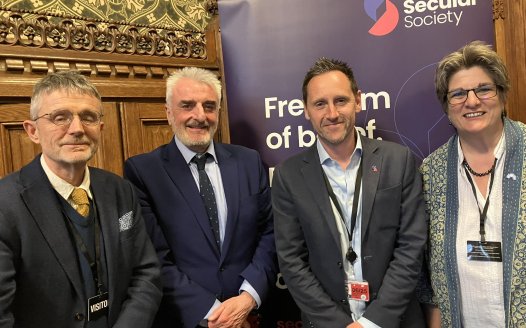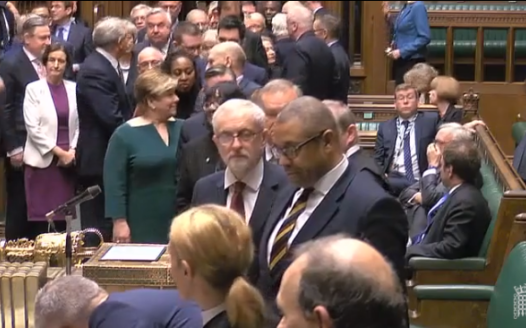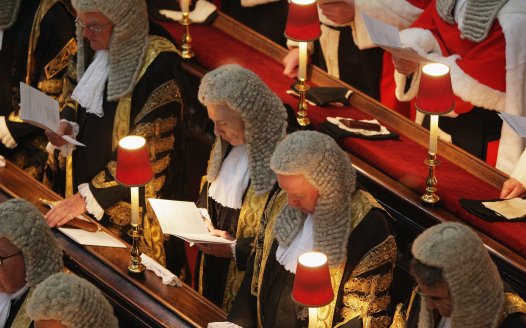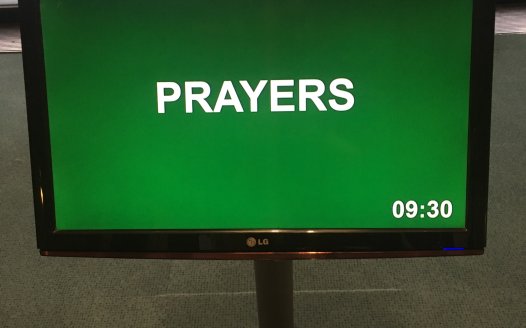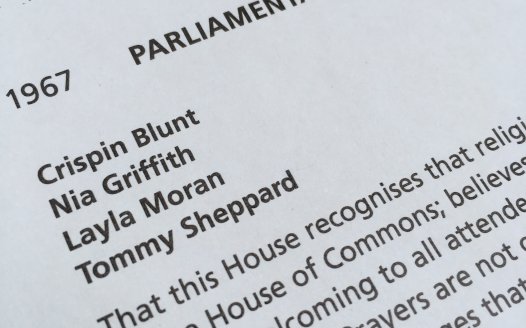MPs want God at centre of local democracy
Posted: Thu, 15th Jan 2015 by Imran Khan
When Conservative councillor Imran Khan opted out of Christian prayers at council meetings he was subject to ostracization, abuse and deselection. He's urging MPs to keep sectarianism out of local politics by voting against the Local Government (Religious Etc. Observances) Bill.
Tory MP Jake Berry's Private Member's Bill, which seeks to put God back at the centre of local democracy reaches the Report Stage on Friday. MPs are seeking to overturn a 2012 High Court ruling that the law does not give councils the power to introduce a religious dimension to meetings. As anyone who has attended a formal council meeting where prayers are taking place knows, council business proceedings begin with a vicar reading the Lord's Prayer, usually accompanied by prayers asking for God to ensure councillors make decisions based on his holy guidance, and asks God to kindly ensure councillors don't act corruptly. Importantly, the prayers are recognized as a formal part of council business, everyone in the room is upstanding, looking downwards, and many will chant out the words aloud.
Following a successful campaign led by the National Secular Society in 2012 and a High Court judgment, this embarrassing anachronism should have been kicked out of councils forever. However, religionists responded as expected and their chief cheerleader in the Commons, Eric Pickles MP, pleaded with councils to carry on as normal, promising to lobby for the legislation being discussed on Friday.
The Local Government (Religious Etc. Observances) Bill seeks to make provision for the inclusion of prayers or "other religious observance" or "observance connected with a religious or philosophical belief" at local authority meetings. Back in 2012, the High Court ruled that "The saying of prayers as part of the formal meeting of a Council is not lawful under s111 of the Local Government Act 1972, and there is no statutory power permitting the practice to continue."
Mr Justice Ouseley, the lead judge of the Administrative Court at the Royal Courts of Justice, stated in his ruling that the 1972 Local Government Act did not give councils the power to introduce a religious dimension to their meetings, commenting:
"I do not think that the 1972 Act, dealing with the organisation, management and decision-making of local Councils, should be interpreted as permitting the religious views of one group of Councillors, however sincere or large in number, to exclude or, even to a modest extent, to impose burdens on or even to mark out those who do not share their views and do not wish to participate in their expression of them. They are all equally elected Councillors."
Local authorities have a statutory duty to advance equality of opportunity between people who share a protected characteristic and those who do not. Many councillors and residents attending meetings are not Christian or do not belong to any other faith, but are being forced to sit through Christian, and in rare cases, other religions' prayers. As a former Tory councillor, I found this experience to be wholly alienating.
As someone who does not wish to recite Christian prayers, I had to wait outside the room while the prayers were taking place. This clearly set me apart as being different from all the other councillors, several of whom suggested to me that not only was I being "difficult" as this was such a trivial issue, but that I had no right to exempt myself from the meetings. Since I had to walk across the floor afterwards, bumping past the mainly elderly white audience, people thought I was either purposely trying to be disrespectful to their beliefs, or I was late to the meeting – something taken very seriously by other councillors.
Krishnan Guru-Murthy read out my statement to Eric Pickles on Channel 4 News, who responded by saying that Britain was a "Christian country" and that "An act of Christian worship has been part of our cultural heritage and this is a fundamental attack on that. It does seem to me that it's been part of our culture to do so, and I think there's nothing wrong in standing up for part of British, traditional Christian culture."
Senior Tory councillors at the time advised me that if I did not like how things were being done, then I should consider leaving the country. I received an email (which I have retained) from an executive member of council - copied to the rest of the Conservative group – that read: "As far as I am concerned the most basic gift we can offer the minorities is the one we all enjoy and that is freedom. Freedom to not attend, walk away, or go somewhere else if you don't like the way we live." This view was shared widely by the other Conservative members at Reigate and Banstead Borough Council.
Being told to consider leaving the country if I do not agree with a Tory culturally chauvinist view of society – one at odds with the judgment of a High Court Judge – certainly sits uneasily with my need to participate as an active citizen who believes in liberal democratic freedoms. However, it is not just local councillors calling for the prioritisation of Christianity above other communities in councils. Tory MP, Sir Edward Leigh hopes to amend the bill so that it is not just religion that will be formalised in councils but specifically Christianity. He hopes to move the following amendment:
"Judaeo-Christian tradition - In observing the provisions in this Act, councils shall keep in mind the preeminence of the Judaeo-Christian tradition as the historical foundation of the United Kingdom."
Labour's Lyn Brown MP (Shadow Communities Minister) also called the 2012 High Court ruling "perverse" in Parliament at Committee stage. Bearing in mind the adverse impact on political participation, it is hard to believe the Bill has received serious scrutiny or consideration in parliament, with MPs on this Public Bill Committee failing to properly consider the implications of the divisive legislation.
Supporters of this Bill claim it increases 'religious freedom'. In fact, democracy requires freedom to participate in public proceedings on an equal footing with everyone else. Councillors who want to pray before meetings should not be stopped from doing so. But, including prayers as part of formal council business prevents me and many others like me up and down the country from participating in active political life. This Friday, I hope parliamentarians on all sides of the House recognise that an essential feature of being British is the equal opportunity to participate in local democracy.
The NSS briefing on the Bill can be read here
See also: Muslim councillor deselected from Horley after prayer row
Imran Khan is a former Conservative member of Reigate and Banstead Borough Council. The views expressed in this article are those of the author and do not necessarily represent those of the NSS.



